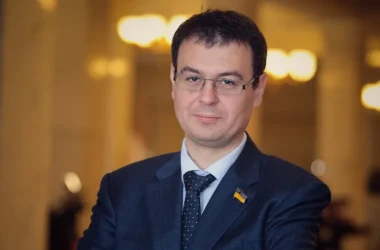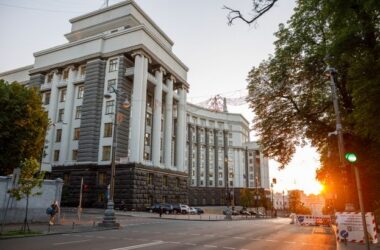The Committee on Digital Transformation issues recommended that the Verkhovna Rada adopt the project in the second reading law “On Virtual Assets”, which will legalize the cryptocurrency market in Ukraine. What to expect for bitcoin owners, told in a column for the EP, the Deputy Minister of Digital Transformation for IT Development Issues Oleksandr Bornyakov.
Anti-Money Laundering
Crypto-assets offer an expanded spectrum of financial services, and have significant potential in terms of social and economic change. In order for crypto-assets to become attributes of the digital economy and a regular part of our citizens’ daily lives, both businesses and consumers must be confident in the possibilities of safe and legal use of the new class of assets. What does this mean in practice?
In order to open a bank account or send a money transfer through the payment system, users must provide their personal data.
Know Your Customer is a requirement aimed at limiting activities related to money laundering. Often, providers of services related to the circulation of virtual assets ignore these rules, as such requirements partly restrain the registration of new users on crypto services.
Recent enforcement trends in the cryptosphere suggest that cryptoassets, as one of the mechanisms for moving values, are subject to AML compliance requirements.
This means that the relevant KYC/AML requirements will apply to crypto exchanges, depository services, custodial crypto wallets and other service providers in the interests of third parties.
For companies from the real sector of the economy and financial institutions, it is important to understand the regulatory landscape in which the new asset class will operate and the associated risk factors.
They will not be able to work and create new tools in a market that does not allow to confirm the legitimacy of the sources of origin of their own assets.
The draft law “On virtual assets” provides for the creation of a new regulator – the National Service for the Regulation of the Circulation of Virtual Assets (NSVA), whose competences will include issuing permits to professional participants of the virtual assets market and monitoring their business activities.
They will be subject to the AML law as subjects of primary financial monitoring. They will monitor suspicious transactions and stop providing their services to users who try to do them.
State registration of crypto exchanges
Today, providers of services related to the circulation of virtual assets function as a new layer of financial intermediaries. They operate in an uncertain legal environment and are therefore less accountable than banks and other financial institutions.
Implementation in Ukraine of a mechanism of legal regulation in the sphere of virtual assets does not mean “regulation of decentralized technologies”. It is about the application of legal relations with service providers related to the circulation of virtual assets – crypto companies and crypto projects from the service sector.
In order to pass state registration, such service providers must disclose their ownership structure to enable identification of ultimate beneficiaries and implement internal financial monitoring procedures to prevent money laundering. To function in a regulated space, crypto projects should prepare in advance rather than respond to requirements afterwards.
The draft law will establish a reasonable balance between the need for state regulation and the attractiveness of the conditions for conducting crypto-business in Ukraine.
We have an understanding that if our citizens, given the strict restrictions on transactions with virtual assets in Ukraine, prefer to work with foreign crypto-exchanges, the crypto-asset market will not come out of the shadows.
This will also mean that our country will not only lose taxes, but will also suffer significant image damage as an unpopular jurisdiction for virtual assets.
Strengthening cooperation with FATF
Today’s trend is flexible regulation of the new industry, aimed at preventing the risks associated with the circulation of virtual assets, which, at the same time, does not restrain the development of innovation within each individual country.
The common denominator for international regulation in the crypto sector is compliance with FATF (International Anti-Money Laundering Group) recommendations for regulating the circulation of virtual assets.
It is a mistake to think that the FATF is seeking to limit the use of the new asset class. The position of the FATF is that it is expedient for states to be guided by the principle of “it is better to allow and mark the framework than to completely prohibit”, because with legalization, new assets will be in the state’s field of vision.
This will ensure compliance with international requirements in the field of combating money laundering and terrorist financing.
A jurisdiction that does not comply with the FATF at all will be considered riskier. In the long term, this will make it more difficult for crypto companies that are registered in Ukraine and cooperate with companies from other jurisdictions that have stricter rules to do business.
Globally, the virtual asset industry is just beginning to adapt to regulatory requirements. It is necessary to remember not only the risks, but also the long-term prospects that arise due to the development of innovations.
I like the approach of transforming problems into opportunities. The development of appropriate legislation on virtual assets in combination with the introduction of financial monitoring procedures will contribute, in particular, to the reduction of corruption in the political system of our country.
That is why the team of our ministry is working to create a regulated environment for the circulation of virtual assets, which will strengthen the detinization of the new market and eliminate a number of risks associated with transactions with them.
Promoting the development of the crypto industry
Regulation is often perceived as exclusively restricting the freedom of action of market participants. However, laws can actively stimulate the development of one or another branch of the economy.
In particular, the profile draft law will provide additional economic incentives for crypto business. Ukrainian companies working with virtual assets will finally get full access to banking services.
Banking institutions will provide custodial services for the storage of virtual assets, open accounts for operations with such assets. Due to the creation of a legal field for work in the market of virtual assets, the involvement of more investors will increase. This will facilitate the inflow of liquidity and reduce the overall volatility inherent in this dynamic market.








